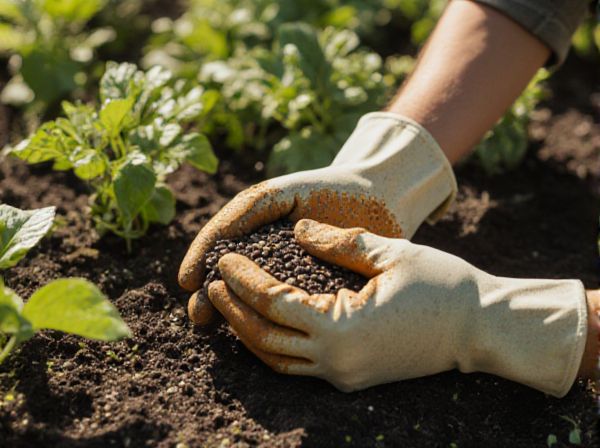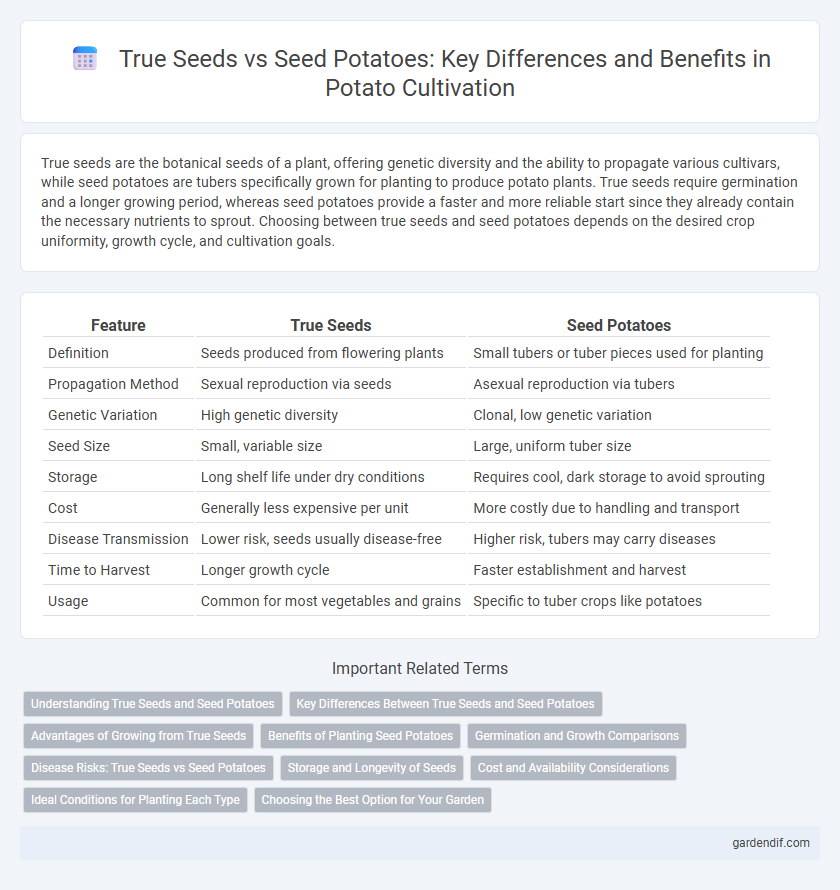
True seeds vs Seed potatoes Illustration
True seeds are the botanical seeds of a plant, offering genetic diversity and the ability to propagate various cultivars, while seed potatoes are tubers specifically grown for planting to produce potato plants. True seeds require germination and a longer growing period, whereas seed potatoes provide a faster and more reliable start since they already contain the necessary nutrients to sprout. Choosing between true seeds and seed potatoes depends on the desired crop uniformity, growth cycle, and cultivation goals.
Table of Comparison
| Feature | True Seeds | Seed Potatoes |
|---|---|---|
| Definition | Seeds produced from flowering plants | Small tubers or tuber pieces used for planting |
| Propagation Method | Sexual reproduction via seeds | Asexual reproduction via tubers |
| Genetic Variation | High genetic diversity | Clonal, low genetic variation |
| Seed Size | Small, variable size | Large, uniform tuber size |
| Storage | Long shelf life under dry conditions | Requires cool, dark storage to avoid sprouting |
| Cost | Generally less expensive per unit | More costly due to handling and transport |
| Disease Transmission | Lower risk, seeds usually disease-free | Higher risk, tubers may carry diseases |
| Time to Harvest | Longer growth cycle | Faster establishment and harvest |
| Usage | Common for most vegetables and grains | Specific to tuber crops like potatoes |
Understanding True Seeds and Seed Potatoes
True seeds are the fertilized ovules of flowering plants, containing the genetic material to grow new plants identical or similar to the parent, commonly used for growing vegetables, flowers, and grains. Seed potatoes are tubers from potato plants used for propagation, containing dormant buds or "eyes" that sprout into new potato plants, ensuring genetic consistency. Understanding the distinction is critical for farming practices, as true seeds allow genetic variation and hybridization, while seed potatoes guarantee clonal reproduction and uniform crop quality.
Key Differences Between True Seeds and Seed Potatoes
True seeds are the reproductive units produced by flowering plants through sexual reproduction and contain genetic variations. Seed potatoes are tubers or pieces of tubers used to propagate potato plants vegetatively, ensuring genetic consistency. The key difference lies in true seeds offering genetic diversity while seed potatoes provide uniformity and faster crop establishment.
Advantages of Growing from True Seeds
Growing from true seeds offers significant advantages such as genetic diversity, which enhances disease resistance and adaptability to varying climates. True seeds are less expensive and easier to store compared to seed potatoes, reducing overall cultivation costs. This method also allows for the propagation of new cultivars with improved traits, fostering innovation in crop development.
Benefits of Planting Seed Potatoes
Planting seed potatoes ensures consistent crop quality and higher disease resistance compared to true seeds. Seed potatoes produced from certified sources carry genetic traits that promote uniform tuber size and enhanced yield potential. Utilizing seed potatoes accelerates growth cycles, offering reliable and productive harvests in commercial and home gardening alike.
Germination and Growth Comparisons
True seeds exhibit a germination rate influenced by factors such as seed viability, moisture, and temperature, often requiring several weeks to sprout, while seed potatoes eliminate the germination phase by using tubers capable of immediate shoot emergence. Growth from true seeds involves initial root and shoot development, making it a slower process compared to seed potatoes, which rapidly establish stems and leaves due to stored nutrients in the tuber. This fundamental difference significantly impacts yield timelines and cultivation strategies.
Disease Risks: True Seeds vs Seed Potatoes
True seeds carry minimal disease risks as they do not host soil-borne pathogens or viruses, ensuring cleaner starting material for crops. Seed potatoes, however, are prone to transmitting diseases such as potato blight, bacterial wilt, and seed-borne viruses, which accumulate with each planting cycle. Choosing true seeds over seed potatoes significantly reduces the incidence of these diseases, promoting healthier plants and higher yields.
Storage and Longevity of Seeds
True seeds can be stored for several years if kept in cool, dry, and dark conditions, maintaining viability and germination rates. Seed potatoes, being tubers, have a much shorter shelf life and require careful temperature and humidity control to prevent sprouting and decay during storage. Proper storage of true seeds involves moisture-proof containers and temperatures around 4-10degC, while seed potatoes need temperatures close to 4degC with high humidity to extend their longevity.
Cost and Availability Considerations
True seeds generally cost less per unit and are widely available from multiple suppliers, making them accessible for large-scale planting. Seed potatoes tend to be more expensive due to the need for disease-free certification and limited seasonal availability, often requiring specialized storage conditions. Choosing between true seeds and seed potatoes depends on budget constraints and the immediate planting timeline, as seed potatoes can yield quicker harvests despite higher costs.
Ideal Conditions for Planting Each Type
True seeds require well-drained soil with consistent moisture and temperatures between 65degF and 75degF for optimal germination. Seed potatoes thrive in loose, rich soil with good aeration and a soil temperature around 45degF to 55degF to encourage sprout development. Both types benefit from planting in areas with full sun exposure and minimal frost risk to ensure healthy growth.
Choosing the Best Option for Your Garden
True seeds offer genetic diversity and the potential for unique plant variations, making them ideal for gardeners seeking variety and adaptability. Seed potatoes provide a reliable, disease-free starting point that ensures faster crop establishment and uniform growth, especially important for consistent harvests. Evaluating your garden's goals and local growing conditions will help determine whether the genetic variation of true seeds or the dependable vigor of seed potatoes best suits your cultivation needs.
True seeds vs Seed potatoes Infographic

 gardendif.com
gardendif.com